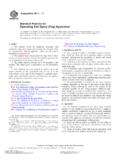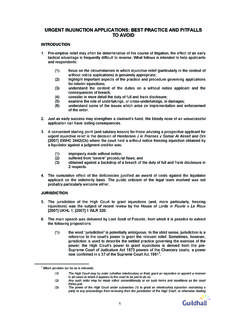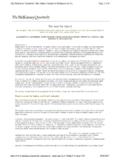Transcription of Improving School Leadership - OECD.org
1 Improving School Leadership VOLUME 1: POLICY AND PRACTICEI mproving School Leadership VOLUME 1: POLICY AND PRACTICEAs countries strive to reform education systems and improve student results, School Leadership is high on education policy agendas. But in many countries, the men and women who run schools are overburdened, underpaid and near retirement. And few people are lining up for their jobs. What Leadership roles contribute most to Improving student learning? How best to allocate and distribute Leadership tasks? How to develop the right skills for effective School Leadership ? How to make the profession attractive to high-quality candidates? This book is based on an OECD study of School Leadership practices and policies around the world. Offering a valuable cross-country perspective, it identifies four policy levers and a range of policy options to help governments improve School Leadership now and build sustainable Leadership for the Volumes Improving School Leadership Volume 2: Case Studies on System Leadership examines innovative approaches to sharing Leadership across schools in Belgium (Flanders), Finland and the United Kingdom (England) and Leadership development programmes for system improvement in Australia and School Leadership : The Toolkit is designed to support policy makers and practitioners to think through reform processes for schools and education systems in their national context.
2 It is available as a free download at Effective School Leadership is viewed as key to education reform worldwide. These books will be of interest to policy makers, School boards, School administrators, principals, teachers and full text of this book is available on line via this link: with access to all OECD books on line should use this link: is the OECD online library of books, periodicals and statistical databases. For more information about this award-winning service and free trials ask your librarian, or write to us at 978-92-64-04467-8 91 2008 05 1 P-:HSTCQE=UYY[\]:PRINCIP DISTRIBUTED Leadership Leadership TEAM HEAD TEACHER HEAD TECHER Leadership TEAM PRINCIPAL DISTRI HEAD TEACHER DISTRIBUTED Leadership PRINCILEADERSHIP TEAM PRINCIPAL DISTRIBUTED Leadership HEAD TEACHER LEADERSHHEAD TEACHER PRINCIPAL D DISTRIBUTED Leadership PRINCIPAL Leadership TEAM HEAD TEACHER DISTRI PRINCIPAL DISTRIBUTED Leadership HEAD TEACHER Leadership TEAM PRINCIPAL DISTRIBUTED Leadership HEAD TEACHER Leadership TEAM PRINCIPAL HEAD TEACHER Leadership TEAM DISTRIBUTED Leadership PRINCIPAL Leadership TEAM HEAD DISTRIBUTED Leadership Leadership TEAM HEAD TEACHER PRINCIPAL DISTRIBUTED Leadership Leadership TEAM HEAD TEACHER PRINCIPAL DISTRIBUTED Leadership Leadership TEAM HEAD TEACHER DISTRIBUTED Leadership PRINCIPAL Leadership TEAM HEAD TEACHER DISTRIBUTEDHEAD TEACHER Leadership TEAM PRINCIPAL DISTRIBUTED Leadership HEAD TEACHER Leadership TEAM
3 PRINCIPAL DISTRIBUTED Leadership HEAD TEACHER LEADERHEAD TEACHER DISTRIBUTED Leadership PRINCIPAL Leadership TEAM HEAD TEACHER DISTRIBUTED Leadership PRINCI Leadership TEAM PRINCIPAL DISTRIBUTED Leadership HEAD TEACHER PRINCIPAL DISTRIBUTED Leadership HEAD TEACHER Leadership TEAM PRINCIPAL DISTRIBUTED DISTRIBUTED Leadership PRINCIPAL Leadership TEAM HEAD TEACHER DISTRIBUTED Leadership PRINCIPAL Leadership DISTRIBUTED Leadership HEAD TEACHER Leadership TEAM PRINCIPAL DISTRIBUTED Leadership HEAD TEACHER Leadership TEAM PRINCIPAL DISTRIBUTED Leadership PRINCIPAL Leadership TEAM HEAD TEACHER DISTRIBUTED Leadership PRINCIPAL Leadership TEAM HEAD TEACHER DIST HEAD TEACHER Leadership TEAM PRINCIPAL DISTRIBUTED Leadership HEAD TEACHER Leadership TEAM PRINCIPAL DISTRIBUTED Leadership HEAD TEACHER LEADER Leadership TEAM HEAD TEACHER DISTRIBUTED Leadership PRINCIPAL Leadership TEAM HEAD TEACHER DISTRIBUTED LLEADERSHIP TEAM PRINCIPAL DISTRIBUTED Leadership HEAD TEACHER Leadership TEAM PRINCIPAL DISTRIBUTED Leadership HEAD TEACHER Leadership TEAM PRIN HEAD TEACHER DISTRIBUTED Leadership PRINCIPAL Leadership TEAM HEAD TEACHER DISTRIBUTED Leadership PRINC PRINCIPAL DISTRIBUTED Leadership HEAD TEACHER Leadership TEAM PRINCIPAL DISTRIBUTED Leadership HEAD TEACHER Leadership TEAM PRINCIPAL DISTRIBUTED LDISTRIBUTED Leadership PRINCIPAL Leadership TEAM HEAD TEACHER DISTRIBUTED Leadership PRINCIPA DISTRIBUTED Leadership HEAD TEACHER Leadership TEAM PRINCIPAL DISTRIBUTED Leadership HEAD TEACHER LEADERSH PRINCIPAL Leadership TEAM HEAD TEACHER DISTRIBUTED Leadership PRI HEAD TEACHER Leadership TEAM PRINCIPAL DISTRIBUTED Leadership HEAD TE
4 Leadership TEAM HEAD TEACHER DISTRIBU Leadership TEAM PRINCIPAL DISTRIBU Improving School Leadership VOLUME 1: POLICY AND PRACTICEBy Beatriz Pont, Deborah Nusche, Hunter MoormanImproving School Leadership VOLUME 1: POLICY AND PRACTICEBy Beatriz Pont, Deborah Nusche, Hunter MoormanORGANISATION FOR ECONOMIC CO-OPERATION AND DEVELOPMENTThe OECD is a unique forum where the governments of 30 democracies work together toaddress the economic, social and environmental challenges of globalisation. The OECD is also atthe forefront of efforts to understand and to help governments respond to new developments andconcerns, such as corporate governance, the information economy and the challenges of anageing population. The Organisation provides a setting where governments can compare policyexperiences, seek answers to common problems, identify good practice and work to co-ordinatedomestic and international OECD member countries are: Australia, Austria, Belgium, Canada, the Czech Republic,Denmark, Finland, France, Germany, Greece, Hungary, Iceland, Ireland, Italy, Japan, Korea,Luxembourg, Mexico, the Netherlands, New Zealand, Norway, Poland, Portugal, the Slovak Republic,Spain, Sweden, Switzerland, Turkey, the United Kingdom and the United States.
5 The Commission ofthe European Communities takes part in the work of the Publishing disseminates widely the results of the Organisation s statistics gathering andresearch on economic, social and environmental issues, as well as the conventions, guidelines andstandards agreed by its available in French under the title:Am liorer la direction des tablissements scolairesVOLUME 1 : POLITIQUES ET PRATIQUESC orrigenda to OECD publications may be found on line at: OECD 2008 OECD freely authorises the use, including the photocopy, of this material for private, non-commercial purposes. Permission to photocopy portionsof this material for any public use or commercial purpose may be obtained from the Copyright Clearance Center (CCC) at or theCentre fran ais d'exploitation du droit de copie (CFC) All copies must retain the copyright and other proprietary notices in theiroriginal forms.
6 All requests for other public or commercial uses of this material or for translation rights should be submitted to work is published on the responsibility of the Secretary-General of the OECD. Theopinions expressed and arguments employed herein do not necessarily reflect the officialviews of the Organisation or of the governments of its member 3 Improving School Leadership , VOLUME 1: POLICY AND PRACTICE ISBN 978-92-64-04467-8 OECD 2008 ForewordSchool Leadership is now an education policy priority around the world. Increasedschool autonomy and a greater focus on schooling and School results have made itessential to reconsider the role of School leaders. There is much room for improvement toprofessionalise School Leadership , to support current School leaders and to make schoolleadership an attractive career for future candidates.
7 The ageing of current principals andthe widespread shortage of qualified candidates to replace them after retirement make itimperative to take School Leadership , Volume 1: Policy and Practiceexplains why schoolleadership has become a key policy priority and sets out four policy levers which, takentogether, can contribute to improve School Leadership and School outcomes. The book isbased on an OECD study of School Leadership around the world, with the participation ofAustralia, Austria, Belgium (Flemish and French Community), Chile, Denmark, Finland,France, Hungary, Ireland, Israel, Korea, The Netherlands, New Zealand, Norway,Portugal, Slovenia, Spain, Sweden and the United Kingdom (England, Northern Irelandand Scotland).Each of these 22 education systems prepared a detailed background report analysingnational approaches to School Leadership .
8 In addition, five case studies on schoolleadership focusing on system improvement and training and development complementthe comparative work by providing examples of innovative practice (published in acompanion volume, Improving School Leadership , Volume 2: Case Studies on SystemLeadership). In this way, we were able to collect the information necessary to comparecountry developments and adopt an innovative and forward-looking approach to School Leadership activity produced a significant body of knowledgeon this issue in the form of country background reports and innovative case study reports,all of which are available on the OECD website people shared their expertise and knowledge to make this a successful activity andthere have been many opportunities for exchange. Three international conferences andthree workshops brought together national coordinators, representatives of internationalorganisations and a network of research authors are indebted to the countries who took part in the study, to the extremelyengaged national coordinators, to the expert teams who participated in the country visitsand provided valuable comments on the report and to the countries that hostedconferences and workshops.
9 We are grateful to HSBC Education Trust and DavidHopkins for supporting the case studies and to Judith Chapman, Andrew Hargreaves,Tony Mackay, Robert Schwartz and Fani Stylianidou for their expert contributions to activity was carried out by the Education and Training Policy Division ofOECD s Directorate for Education under the Leadership of Abrar Hasan (until hisretirement) and Deborah Roseveare (since June 2007). Peter Chambers and SusanCopeland edited the report and Judith Corcoran, Jennifer Gouby and Ross Wilkinsprovided administrative OF CONTENTS 5 Improving School Leadership , VOLUME 1: POLICY AND PRACTICE ISBN 978-92-64-04467-8 OECD 2008 Table of contentsExecutive summary .. 9 Chapter Leadership matters .. Introduction .. The concept of School Leadership .. School Leadership is a policy priority.
10 School Leadership responds to changing policy environments .. The current reality of School Leadership .. Summary: why School Leadership matters .. 32 Annex concerning factors influencing student learning .. 33 Annex Levels of School policy decision making .. 35 References .. 36 Chapter 2.(Re)Defining School Leadership responsibilities .. Supporting School Leadership autonomy .. Core responsibilities of School Leadership .. Improving the definition of School Leadership responsibilities .. Summary conclusions and recommendations .. 64 Annex of public schools in lower secondary education .. 67 References .. 68 Chapter School Leadership .. Who participates in School Leadership ? .. Distributed Leadership at work .. School boards play an important role .. Summary conclusions and recommendations .. 93 Annex of Leadership and the role of School boards.
















